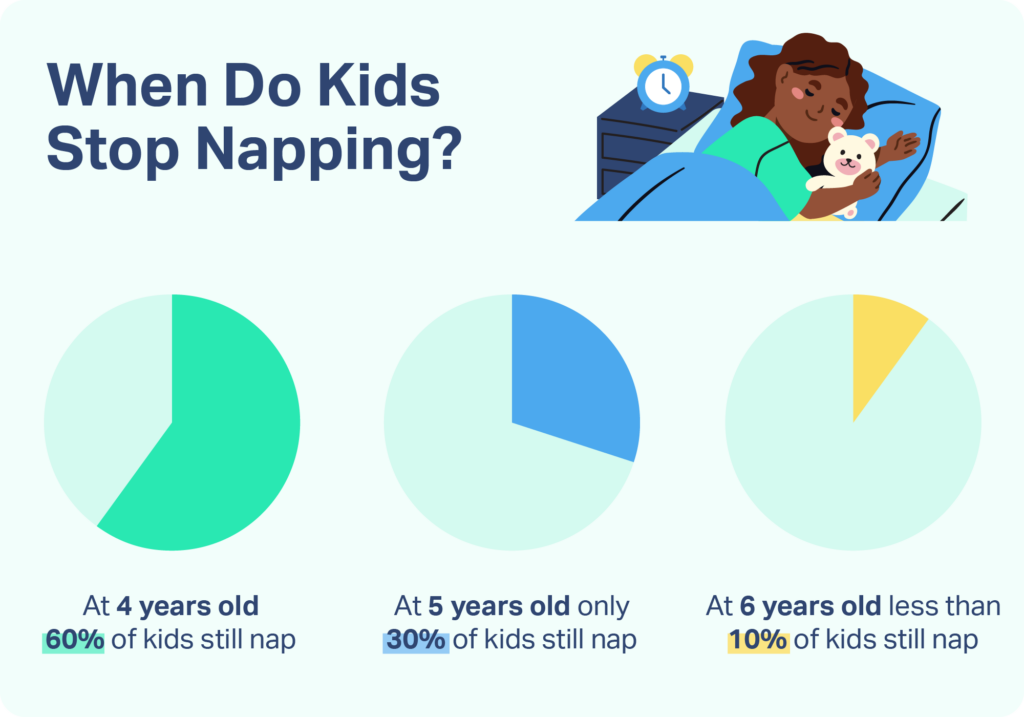When you buy through our links, we may earn a commission. Products or services may be offered by an affiliated entity. Learn more.
How Much Sleep Do Babies and Kids Need?
- Age, temperament, and developmental differences can influence how much sleep a child needs.
- Newborns typically sleep 16 to 18 hours a day, and infants sleep 12 to 16 hours a day, including naps.
- Toddlers should get 11 to 14 total hours, preschool-aged children 10 to 13 total hours, and elementary school-aged children 9 to 12 total hours of sleep each day.
The American Academy of Sleep Medicine (AASM) offers recommendations for children’s total daily sleep needs by age group. These recommendations can serve as a general target, but it is important to remember that a healthy amount of sleep may vary among individual babies and kids based on a number of factors, including their temperament and developmental differences.
| Age Group | Age Range | Recommended hours of sleep per 24 hours |
|---|---|---|
| Infant | 4-12 months | 12-16 hours (including naps) |
| Toddler | 1-2 years old | 11-14 hours (including naps) |
| Preschool | 3-5 years old | 10-13 hours (including naps) |
| School-age | 6-12 years old | 9-12 hours |
How Much Sleep Do Babies Need?
Babies spend the majority of their day sleeping. The typical amount of time that babies sleep depends on their age.
- Newborns: The AASM does not provide specific guidance on the recommended amount of sleep for newborn babies under 4 months old. This is because there is limited data on the effects of sleep duration in newborns and fluctuations in sleep cycles for newborns are common. Newborn babies typically sleep 16 to 18 hours in each 24-hour day, but this sleep is accumulated across a series of naps. It is rare for newborns to sleep through the night without waking up. Caregivers may be able to develop a more regular sleep schedule that accounts for feeding, nighttime sleep segments, and daytime naps when the baby is around 2 months old .
- Infants: Infants between 4 and 11 months of age should get 12 to 16 hours of sleep per day. While some infants might start sleeping through the night at around 5 or 6 months old, infants still get a significant portion of their total sleep from naps during the day.
Help Your Child Sleep Better With Pediatric Sleep Coaching

our partner at sleepdoctor.com
Learn More“Life-changing! My anxiety about my son’s sleeping habits were immediately reduced after talking to Sara. She went above and beyond to tailor a schedule to our goals, answer our questions, keep us on track, and check in to encourage us when we just thought we couldn’t do it anymore.”
Rachael B. – Verified Customer
Why Do Babies Sleep So Much?
Babies spend more than half of their time sleeping because this is a period of substantial growth. Sleep allows the brain to develop, building networks that facilitate thinking and learning as well as the formation of behavior. Sleep and nutrition also allow a baby to develop physically, growing bigger and acquiring better motor skills.
Is It Normal For Babies To Take Naps?
It is very common for babies to nap and obtain a meaningful portion of their total sleep during the day. Newborns often nap during the day, with each nap lasting between one and four hours. Although total nap time decreases as they get older, it is typical for infants to continue to nap for 2 to 3 hours or more each day.
This napping is not just normal but also beneficial. Research has found that frequent naps allow infants to consolidate specific memories. In addition, naps enable a more generalized memory that is important for learning and brain development.
Do Babies Start to Sleep Through the Night?
In general, it is thought that babies start to consolidate their nightly sleeping period at around 5 or 6 months of age, making it more likely for them to sleep through the night. At the same time, research has found that the date of this milestone can vary significantly. In one study, a considerable number of 6- and 12-month-old babies did not sleep either 6 or 8 hours consecutively at night:
| Age | Percent Not Sleeping 6+ Hours Consecutively | Percent Not Sleeping 8+ Hours Consecutively |
|---|---|---|
| 6 months | 37.6% | 57.0% |
| 12 months | 27.9% | 43.4% |
While caregivers often worry if their child takes longer to start sleeping through the night, this same study found that there were no detectable impacts on a child’s physical or mental development if they were not able to sleep for these longer consecutive periods as an infant.
Over time, you can expect an infant to start sleeping for longer segments at night, but to date, the importance of sleeping through the night has not been shown to be more significant for infants than total daily sleep time.
That said, there are steps that parents and caregivers can take to encourage longer periods of consecutive sleep at night, such as sleep training. Any concerns about frequent nighttime awakenings should be discussed with a pediatrician.
How Much Sleep Do Premature Babies Need?
Babies that are born prematurely often need even more sleep than babies born at full term. It is not uncommon for premature babies to spend around 90% of their time asleep . The exact amount that a preterm newborn will sleep can depend on how early they were born and their overall health.Over the course of the first 12 months, a premature baby’s sleep patterns come to resemble those of full-term infants , but for an initial period, they often have more total sleep, lighter sleep, and less consistent sleep overall.
How Does Feeding Affect Sleep For Babies?
There is some debate about how and whether the method of feeding affects a baby’s sleep. While some research has found more nighttime awakenings in babies who are breastfed, other studies have found little difference between sleep patterns of breastfed and formula-fed babies.
Although not firmly established, there is some evidence that babies who are breastfed may have better sleep during their preschool years. More research is needed to understand the relationship between feeding and sleep in babies.
What Can You Do if Your Baby Doesn’t Sleep Enough?
Parents who have concerns about their baby’s sleep should start by speaking with a pediatrician. Keeping a sleep diary to track your child’s sleep patterns may help the doctor determine if your baby’s sleep has a normal pattern or may reflect a potential sleeping problem.
For babies who struggle to sleep through the night, behavioral changes may encourage longer sleep sessions. For example, reducing the speed of response to awakenings may encourage self-soothing, and gradually pushing back bedtime may create more sleepiness that helps a baby stay asleep longer.
It may also be beneficial to improve sleep hygiene by creating a consistent sleep schedule and routine and ensuring that the baby has a calm and quiet environment for sleep. Infant sleep hygiene should also account for important safety measures to prevent the risk of suffocation and sudden infant death syndrome (SIDS).
How Much Sleep Do Kids Need?
Children’s sleep needs change significantly as they get older. As they move from toddlers to school age, their sleep becomes increasingly similar to that of adults. In this process, the sleep requirements for young children decline, and that is reflected primarily in a decreased amount of time spent napping during the day.
Even though kids sleep for fewer hours than babies, sleep remains critical to their overall health and development. Lack of sufficient sleep at a young age has been correlated with problems with weight, mental health, behavior, and cognitive performance.
- Toddlers: It is recommended that toddlers between 1 and 2 years old get between 11 and 14 hours of total sleep every day. Their napping decreases compared to infants and frequently accounts for around 1 to 2 hours of daily sleep. Two naps per day is normal at the start of this period, but many older toddlers only take one nap in the afternoon.
- Preschool: Preschool-aged children who are 3 to 5 years old should get around 10 to 13 total hours of sleep per day . During this time, naps may get shorter, or a preschooler may stop napping on a regular basis.
- School-Age: School-age children should sleep for a total of 9 to 12 hours every day. The school-age group includes a wider set of ages, and the individual needs of any given child in this group can vary significantly. Younger school-age children typically need more sleep than those who are in middle school or approaching high school. When children start to go through puberty and enter adolescence, their sleep patterns change markedly, which can give rise to distinct challenges that confront teens and sleep.
Is It Normal For Kids To Take Naps?
For many kids, it is normal to take naps, especially when they are toddlers and preschool-aged. During these years, napping may continue to provide benefits for memory and thinking. During early childhood, naps become both shorter and less frequent. This may occur naturally or as a result of schedules for school or child care.

Although many children stop napping by age 6, remember that nap preferences can be different for every child. In preschools with scheduled nap time, some children sleep easily, but others — up to 42.5% in one study — fall asleep only sometimes or not at all.
Some older children may still be inclined to nap and can benefit from doing so. In a study in China, children in grades 4 through 6 who took frequent naps after lunch showed signs of better behavior , academic achievement, and overall happiness.
The existing research about napping and optimal timing of sleep episodes is inconclusive and acknowledges that what is best for one child can change over time and may not be what is best for another child of the same age. For this reason, parents, teachers, and child care workers may be able to best encourage optimal sleep for kids by being flexible and understanding about naps.
What Can You Do if Your Child Doesn’t Sleep Enough?
It is estimated that up to 50% of children have trouble sleeping. While the nature of sleeping challenges vary, parents and caregivers should talk with children about sleep and raise the issue with their pediatrician if there are signs of severe or persistent problems, including insomnia.
Helping children sleep often starts with creating a bedroom environment that is peaceful, quiet, and comfortable. Finding the best mattress for your child’s needs and minimizing blue light, such as from TV or other electronic devices, can make it easier for children of any age to get consistent sleep.
Establishing healthy sleep habits, including a stable sleep schedule and bedtime routine, can reinforce the importance of bedtime and cut down on night-to-night variability in sleep. Giving children an opportunity to use up their energy during the day and to unwind before bedtime can make it easier for them to fall asleep and stay asleep through the night.

Still have questions? Ask our community!
Join our Sleep Care Community — a trusted hub of sleep health professionals, product specialists, and people just like you. Whether you need expert sleep advice for your insomnia or you’re searching for the perfect mattress, we’ve got you covered. Get personalized guidance from the experts who know sleep best.
References
12 Sources
-
Paruthi, S., Brooks, L. J., D’Ambrosio, C., Hall, W. A., Kotagal, S., Lloyd, R. M., Malow, B. A., Maski, K., Nichols, C., Quan, S. F., Rosen, C. L., Troester, M. M., & Wise, M. S. (2016). Consensus statement of the American Academy of Sleep Medicine on the recommended amount of sleep for healthy children: Methodology and discussion. Journal of Clinical Sleep Medicine, 12(11), 1549–1561.
https://pubmed.ncbi.nlm.nih.gov/27707447/ -
Kirsch, D. (2022, September 12). Stages and architecture of normal sleep. In S. M. Harding (Ed.). UpToDate., Retrieved February 9, 2023, from
https://www.uptodate.com/contents/stages-and-architecture-of-normal-sleep -
Deshpande, P., Salcedo, B., & Haq, C. (2022). Common sleep disorders in children. American Family Physician, 105(2), 168–176.
https://pubmed.ncbi.nlm.nih.gov/35166510/ -
Pennestri, M. H., Laganière, C., Bouvette-Turcot, A. A., Pokhvisneva, I., Steiner, M., Meaney, M. J., Gaudreau, H., & Mavan Research Team (2018). Uninterrupted Infant Sleep, Development, and Maternal Mood. Pediatrics, 142(6), e20174330.
https://publications.aap.org/pediatrics/article/142/6/e20174330/37494/Uninterrupted-Infant-Sleep-Development-and -
Bennet, L., Walker, D. W., & Horne, R. S. C. (2018). Waking up too early – the consequences of preterm birth on sleep development. The Journal of Physiology, 596(23), 5687–5708.
https://pubmed.ncbi.nlm.nih.gov/29691876/ -
Schwichtenberg, A. J., Shah, P. E., & Poehlmann, J. (2013). Sleep and Attachment in Preterm Infants. Infant mental health journal, 34(1), 37–46.
https://pubmed.ncbi.nlm.nih.gov/23482430/ -
Galbally, M., Lewis, A. J., McEgan, K., Scalzo, K., & Islam, F. A. (2013). Breastfeeding and infant sleep patterns: an Australian population study. Journal of paediatrics and child health, 49(2), E147–E152.
https://onlinelibrary.wiley.com/doi/10.1111/jpc.12089 -
Montgomery-Downs, H. E., Clawges, H. M., & Santy, E. E. (2010). Infant feeding methods and maternal sleep and daytime functioning. Pediatrics, 126(6), e1562–e1568.
https://publications.aap.org/pediatrics/article/126/6/e1562/65050/Infant-Feeding-Methods-and-Maternal-Sleep-and -
Murcia, L., Reynaud, E., Messayke, S., Davisse-Paturet, C., Forhan, A., Heude, B., Charles, M. A., de Lauzon-Guillain, B., & Plancoulaine, S. (2019). Infant feeding practices and sleep development in pre-schoolers from the EDEN mother-child cohort. Journal of sleep research, 28(6), e12859.
https://onlinelibrary.wiley.com/doi/10.1111/jsr.12859 -
Smith, S. S., Edmed, S. L., Staton, S. L., Pattinson, C. L., & Thorpe, K. J. (2019). Correlates of naptime behaviors in preschool aged children. Nature and science of sleep, 11, 27–34.
https://pubmed.ncbi.nlm.nih.gov/31118848/ -
Liu, J., Feng, R., Ji, X., Cui, N., Raine, A., & Mednick, S. C. (2019). Midday napping in children: associations between nap frequency and duration across cognitive, positive psychological well-being, behavioral, and metabolic health outcomes. Sleep, 42(9), zsz126.
https://pubmed.ncbi.nlm.nih.gov/31135911/ -
Carter, K. A., Hathaway, N. E., & Lettieri, C. F. (2014). Common sleep disorders in children. American Family Physician, 89(5), 368–377.
https://pubmed.ncbi.nlm.nih.gov/24695508/




















